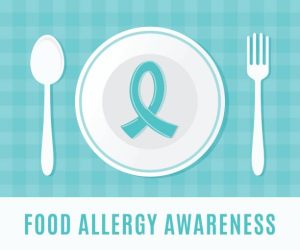
In this guide, we’ll explore essential information and strategies for recognizing and managing food allergies in children to promote their safety and well-being.
Allergy Awareness: Recognizing and Managing Food Allergies in Children:
Know Common Food Allergens:
Educate yourself about common food allergens, including peanuts, tree nuts, milk, eggs, soy, wheat, fish, and shellfish.
Read food labels carefully and be vigilant about potential allergens in packaged and processed foods.
Recognize Allergy Symptoms:
Be familiar with common symptoms of food allergies, such as hives, itching, swelling, wheezing, difficulty breathing, vomiting, diarrhea, and anaphylaxis.
Monitor your child closely for any signs of allergic reactions, especially after consuming known allergens.
Consult with Healthcare Providers:
Seek guidance from pediatricians, allergists, or healthcare professionals if you suspect your child has a food allergy.
Consider allergy testing, such as skin prick tests or blood tests, to identify specific food allergens and develop an appropriate management plan.
Create an Allergy Action Plan:
Work with your child’s healthcare providers to develop an allergy action plan that outlines steps to take in case of an allergic reaction.
Share the allergy action plan with family members, caregivers, teachers, and school staff to ensure everyone is prepared to respond to emergencies.
Practice Allergy Management at Home:
Implement strict avoidance measures to eliminate exposure to known food allergens in your home environment.
Keep allergen-free zones in your kitchen and pantry, and use separate utensils, cookware, and food preparation areas for allergen-free meals.
Educate Others:
Educate family members, caregivers, teachers, and friends about your child’s food allergies and the importance of allergen avoidance.
Teach others how to recognize allergy symptoms and administer epinephrine auto-injectors in case of severe allergic reactions.
Pack Safe Snacks and Meals:
When sending your child to school, daycare, or social events, pack safe snacks and meals that are free from allergens to prevent accidental exposure.
Communicate with school staff and caregivers about your child’s dietary restrictions and the importance of avoiding cross-contamination.
Teach Self-Advocacy:
Empower your child to advocate for their own safety by teaching them how to read food labels, ask about ingredients, and recognize potential allergens.
Encourage your child to communicate their food allergies confidently and assertively in social situations.
Stay Prepared for Emergencies:
Always carry an epinephrine auto-injector (such as an EpiPen) with you, and ensure that your child, caregivers, and school staff know how to use it in case of anaphylaxis.
Familiarize yourself with emergency procedures and seek immediate medical attention if your child experiences a severe allergic reaction.
Managing food allergies in children requires diligence, vigilance, and proactive measures to ensure their safety and well-being. By staying informed, creating a supportive environment, and working closely with healthcare professionals and caregivers, you can help your child navigate food allergies with confidence and live a happy, healthy life. Remember, allergy awareness and management are essential components of providing optimal care for children with food allergies.